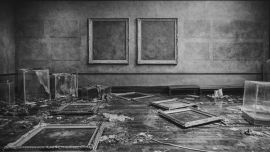Lockdown is limbo. Coronavirus has put everyday life, or the remnants of it, in a loop. Home is where the office lies. There is a recurring pattern that plays out ever since President Alberto Fernández first announced he was placing the nation under quarantine on March 20. This week it is no different – the president on Thursday extended the quarantine period in and around the capital, which was set to expire on Monday, until June 21.
Polls show support for the lockdown but public opinion now favours some relaxation of the restrictions to sweeten the confinement that is dragging out. The public gets what the public wants. In Buenos Aires City, for instance, there will be more weekend time out for children. In neighbouring Buenos Aires Province the focus is allowing industries to return to work. The province includes working-class Greater Buenos Aires, the sprawling urban belt that surrounds the capital. The concern remains that the virus is spreading in the crammed shantytowns. For the first time on Tuesday more cases were reported in the nation’s most populous province than in Buenos Aires City (about 900 cases on average are now reported on a daily basis, the vast majority in the metropolitan area). Authorities still worry about the collapse of the health system if the clusters in the poor neighbourhoods don't let up over winter.
The situation is a tremendous challenge for the metropolitan area (Buenos Aires City and Greater Buenos Aires) where around 95 percent of nationwide cases have been reported. The rest of the nation looks on as its historically aloof European-minded capital on the banks of the River Plate, which generally considers itself the centre of the republic, is hurting. The political landscape is singular – Buenos Aires City Mayor Horacio Rodríguez Larreta is a leading member of the opposition centre-right coalition, while Buenos Aires Province Governor Axel Kicillof is of another hue. The governor is a progressive Kirchnerite economist who snatched the nation’s biggest province when he scored a landslide victory against his incumbent centre-right rival, María Eugenia Vidal, in last year's election.
It’s still a novelty is that the president, the mayor and the governor are working side-by-side. There are moments of tension, sure, but Rodríguez Larreta and Kicillof met on Wednesday and the president confers with both officials on a regular basis.
The lockdown has a stifling effect on the hearts and minds of the population and there’s still winter to slog through. A group of centre-right scientists and intellectuals warned in a statement that the national government is using the pandemic to curtail liberties and effectively put in place a “dictatorship of infection,” a claim rebuffed by Health Minister Ginés González García. The complainers expose a rift in the centre-right opposition because the BA City mayor and his team have consistently heeded the recommendations of a team of medical experts to lock down – the complainers are calling Argentina's quarantine the longest shutdown the world has ever seen.
The price is economic collapse. The country was already in a recession when the virus hit. Argentina is expected to struggle to service more than US$6t billion dollars in debt which the bondholders can sue for in US courts. Economy Minister Martin Guzmán, a US-trained economist, has now extended the negotiating deadline until June 12. Deadlines have come and gone and still there is no deal. Some in Wall Street are counting this as Argentina’s ninth historic default. Yet even the International Monetary Fund (IMF) is implying that the agreement has to be “sustainable” and there is a limit to what the republic can do to improve the offer. The problem is that vulture bondholders couldn't care less about what a bunch of IMF bureaucrats think about the debt problem.
Still, the virus is changing the financial landscape worldwide. The government, for the second month running, will pay a special emergency family income of 10,000 pesos aimed at eight million financially vulnerable people. The bureaucracy surrounding the payment means that there are delays and huge lines outside banks to collect the money. But effectively this is Argentina's first shot at something akin to universal income, a policy that curdles the blood of libertarians.
The national government is starting to discuss Argentina's economic future after the pandemic. The president met with big business leaders (all male, noticeably) on Wednesday and tried to dispel fears that his administration favours taking stakes in private companies currently using state subsidies to partially pay salaries, an idea floated by one Kirchnerite lawmaker recently. The future could be business friendly if you judge those presidential meetings at face value, but in the meanwhile the lobbies are complaining that the currency exchange controls are getting tighter, forcing importers to use the greenbacks that they have abroad by denying them access to the local dollar market.
The dire economic context, in which tax revenue has plummeted, is peppered by a lawsuit filed by the AFI federal intelligence agency alleging that former centre-right president Mauricio Macri – who lost last year’s election against Fernández’s left-leaning Peronist front – spied on members of his own coalition, opposition politicians, journalists and trade union leaders.























Comments